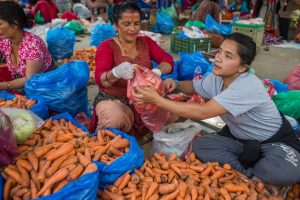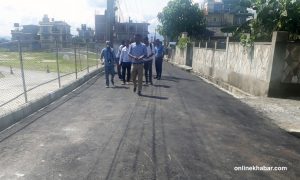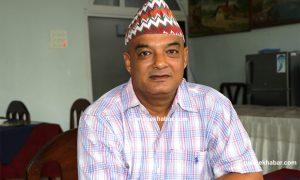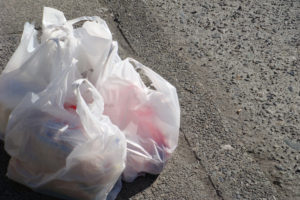
Pradip Khatiwada, 27, lives in Bauddha, Kathmandu. When he needs to buy sugar, he takes a plastic container along. Before the grocer opens the sugar sack, he hands the container over to the shopkeeper. The shopkeeper then puts the sugar in the container.
“When there are other customers waiting in line, they laugh at me,” says Khatiwada, who has not used non-reusable plastic bags for at least five years now.
The plastic bags are easy to carry and they are available for free. Why does he not want to use them?
He answers by telling people that the environmental cost of plastic bags is enormous. But he fails to convince them most of the times. Then, a frustrated Khatiwada thinks, “Had the government implemented its 2015 decision on banning plastic bags in Kathmandu; the situation would have been different.”
What was the decision?

The government decision published in the official gazette on April 1, 2015 states that the import, storage, sale and use of plastic bags that are smaller than 20 inches in width and 35 inches in length and thinner than 40 micron cannot be used in the three districts of Kathmandu Valley.
Khatiwada, who was actively involved in the campaign that pushed the government to take the decision, says the ban in the Valley was a part of the early steps the government was taking. The ban was expected to be expanded to other districts.
Perhaps that is why Mahendra Man Gurung, the then Chief of Environment Management Division at the Ministry of Environment, says, “It was the best decision that the Nepal government had ever taken [about the use of plastic bags] when it comes to saving the environment. No other decision can surpass it.”
“We decided after rounds of discussions with all stakeholders. All of them had agreed, even the plastic producers,” Gurung, who has been closely observing recent developments despite being stationed at a different government department now, says, “All local units of the Valley were convinced.”
Gurung informs that the government also introduced different measures to ensure alternative means were available in the market. Some plastic industrialists had opted for launching production of other kinds of bags. A plan was finalised to launch a massive training programme for producing non-plastic bags. Big shopping centres of the city were told to sell paper or cloth bags.
What caused the jolt?

Then came the magnitude-7.6 earthquake on April 25 and it jolted all efforts to ban plastic bag.
“We were at the ministry the previous day, working with officials on taking next steps to ensure effective implementation of the decision,” Khatiwada shares, “We had finalised some circulations to forward to subordinate government bodies. The officials had said they would circulate the letters on Sunday. But, I think they were never dispatched.”
“Yes, our efforts were dampened after the earthquake. For several weeks, all government officials were mobilised for rescue and relief works,” Gurung remembers, “And, ultimately we missed the opportunity.”
Of course, the rescue and relief work were the priority. However, the government had a choice to revive the ban after some weeks, or even months. But, it did not do anything.
Instead, some business groups looking for an opportunity to intervene in the market circulated bags that were already banned. They got a free ride in the absence of concrete steps by the government.
What are they doing now?

More than three years have passed. Environment Minister Shakti Bahadur Basnet after assuming his office in March 2018 published a 100-point priority list for his five-year term. One of the points was about implementing the decision.
“But, we later concluded that the decision was impractical. Hence, we reduced the ceiling of the ban from 40 microns to 30 microns. We are committed to its implementation,” says Sindhu Prasad Dhungana, spokesperson at the ministry.
But, a few days after the revision of the decision, Bharat Kumar Basnet on behalf of The Explore Nepal Pvt Ltd filed a writ at the Supreme Court arguing the two government decisions–the recent one and the one made in April 2015–were contradictory. Responding to the writ, the Supreme Court on September 2 ordered the government not to implement the recent ban for now. The three-year-old decision had already lost its teeth.
Hence, the government does not have a plan on the issue now. Therefore, the officials seek an easy escape in silence or avoidance. Environment Ministry Secretary Bishwa Nath Oli says, “I will not speak anything about the issue.” Likewise, Dhungana avoids, “I think we are not allowed to comment on the decision taken by the Supreme Court.”
“We have neither rolled back the decision nor executed it,” Dhungana briefly says, maintaining the central government will work with provincial and local governments to reduce the use of plastic bags as a part of its ‘Nepal Clean Environment Mega Campaign’. He, however, fails to spell out any concrete steps.
Industrialists also share the silence maintained by the officials. Rahul Sharma, a young industrialist based in Birgunj, extended support to the anti-plastic bag campaigners three years ago. He was also involved in convincing other industrialists to go for alternative products.
Despite repeated attempts to get his statement over the issue, Sharma refuses to speak now.
The campaigners are also not doing anything. “We should have done something, but we have not,” Khatiwada says, “Let’s wait for this festive season to be over, and we will take the issue ahead seriously.”
It means Khatiwada will continue to be laughed at by his neighbours for carrying his own bag.

























